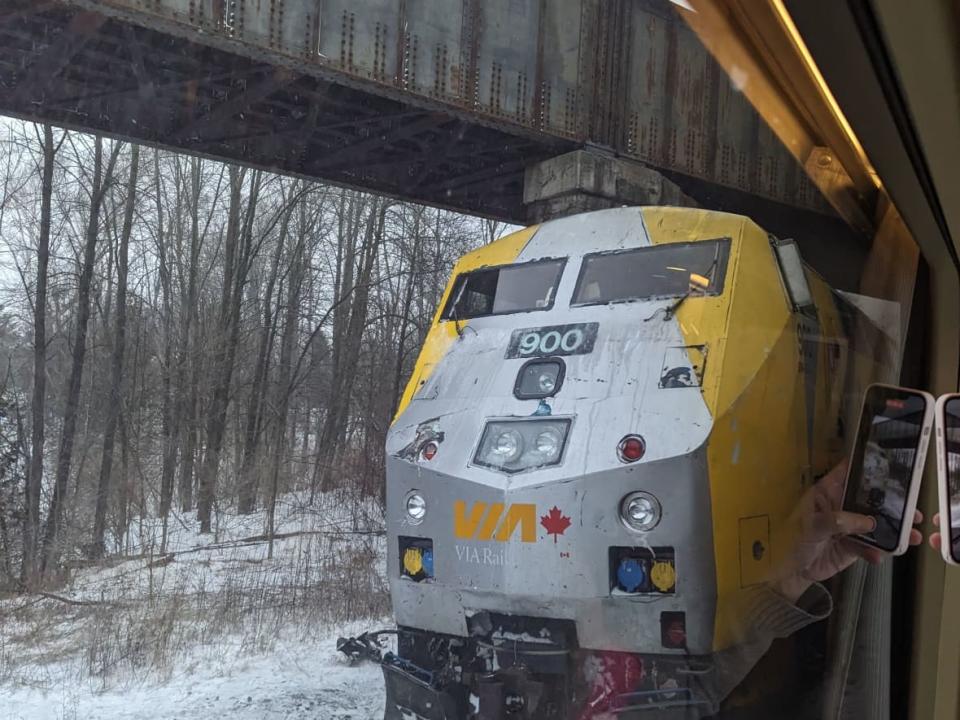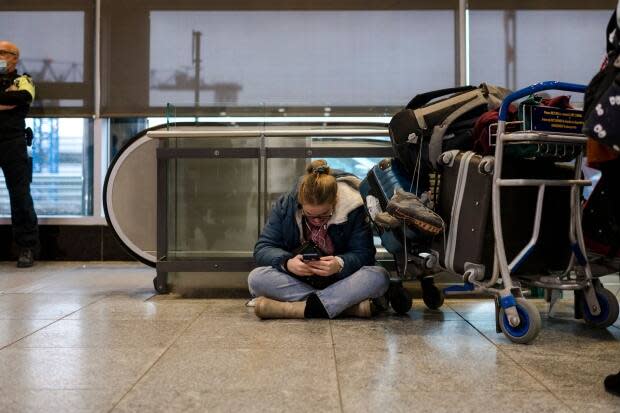Transport minister didn't speak to Via Rail during holiday travel chaos

Federal Transport Minister Omar Alghabra was not personally in contact with officials at Via Rail during the Christmas winter storm that left hundreds of passengers stranded for hours on a disabled train, the railway's executives told a House of Commons committee Thursday.
The executives told MPs on the transport committee that while Via Rail was liaising with Transport Canada and staff in the minister's office during the travel debacle, the railway did not hear from Alghabra until a meeting on Jan. 11 — two weeks after the situation was resolved.
As transport minister, Alghbra is responsible for federally regulated sectors like air and rail travel. He's also the minister in charge of Via Rail, a Crown corporation.
Conservative MP Mark Strahl, the party's transport critic, said it's unacceptable that it took so long for the minister to meet with Via Rail to discuss what was a scary situation for passengers — some of whom spent more than 18 hours stuck aboard Train 55 between Dec. 23 and 24 under trying conditions because of a downed tree.
Via Rail also cancelled all train service on the Toronto-Ottawa-Montreal route for a four-day period between Dec. 23 and 26. The company said debris, prolonged power outages, frozen switches and a derailment made operations impossible.
WATCH: Via Rail train stuck for hours on Dec. 24:
Speaking to reporters at an event on Islamophobia, Alghabra said what passengers went through was "unacceptable" and he "shared that point of view with Via and the CEO of Via."
Alghabra said the corporation must do all it can to ensure "these types of things never happen again."
Asked why Alghabra didn't call Via Rail executives during this travel crisis, a spokesperson for the minister said he kept himself in the loop.
"Instead of taking away resources Via needed to manage the situation and duplicating the work of officials and our office, Minister Alghabra was frequently briefed and gave direction to the officials he was speaking to on a regular basis until the resolution of the situation," said the spokesperson.
WATCH: Via Rail disruptions 'unacceptable,' Alghabra says:
Via Rail executives faced tough questions from MPs about the conditions on Train 55, which was stalled near Cobourg, Ont. after a tree fell on the train.
The railway said the train was isolated on CN-owned tracks and CN wasn't able to safely get to the train to clear the tree in a timely manner, which left passengers in dire straits.
Via Rail apologized Thursday to passengers who did not have access to adequate food and water during the hours-long ordeal and said they're reviewing why staff charged some stranded passengers for the little food that was on board.
WATCH | Via Rail says it failed passengers on stuck train:
The other issue was the state of the on-board washrooms — many of which were unsanitary and, at times, overflowing with human waste.
Rita Toporowski, Via Rail's chief customer officer, said it was inappropriate to charge for food after an overnight delay. She said the company would consider refunding passengers who were charged for food and drinks on board. The company already has refunded Train 55 passengers the full cost of their tickets.
Via Rail also said it was sorry for not communicating effectively with passengers on Train 55 and other routes.
WATCH: Via Rail apology 'not enough,' says passenger stranded during the holidays:
Company policy demands staff update passengers onboard a stalled train every 15 minutes — that protocol wasn't followed in this case, said Toporowski. The company has hired an outside consultancy firm to provide advice on how to better prepare for an emergency situation like this in the future.
Toporowski conceded the washroom situation was "not a nice thing, pretty thing," and that staff did what they could to keep at least "one or two" washrooms operational while passengers were stuck.
CN a no-show at committee
While contrite, Via Rail's executives, including interim CEO Martin Landry, said CN is partly to blame for what transpired over the Christmas period.
Via Rail passenger trains operate almost exclusively on tracks owned by freight railways like CN and CP, which means Via Rail has little control over some operational issues, Landry said.
Those freight rail companies are responsible for maintenance on the sections they own — and helping trains that are in an emergency situation.
"It is the owner who is responsible for assisting us as quickly as possible. We were in constant communication with CN's control system but it was facing its own set of challenges," Landry said, adding the situation was "largely out of our control."
CN and the Railway Association of Canada were called before Thursday's transport committee meeting but declined to appear — a decision that prompted criticism from assembled MPs who said it was inappropriate for them to dodge accountability.
A spokesperson for the Railway Association said it declined an invitation to appear because "we do not have relevant expertise to offer to a review of Air Passenger Protection Regulations."
The committee is probing the treatment of both air and rail passengers by transportation companies in recent months.
The lobby association said Via Rail was "well qualified, and indeed best placed, to provide specific details of their respective (and in some cases unavoidable) operational matters."
In a statement sent to CBC News, a spokesperson for CN said the company's executives "were not available to attend today."
"We remain in discussions with the committee to appear soon," Jonathan Abecassis said.
Via Rail cancelled so many trains over the holidays because of a separate CN train derailment near Grafton, Ont., Landry said.
That train, which was carrying dangerous materials, made portions of the Toronto-Ottawa-Montreal track impassable for 59 hours, which brought passenger rail service to a grinding halt.
The derailment, combined with a "violent winter storm," made it difficult for CN to quickly restore service, CN said in a statement.
"We understand how frustrating it can be to have holiday family gatherings compromised or shortened. Our railroaders battled extreme weather to ensure that the time Canadians spent apart from their families was kept to a minimum," the railway said.
Advocates demand an overhaul of passenger protections
The Commons transport committee also heard Thursday from consumer advocates who are pushing the government to overhaul the air passenger bill of rights — a set of rules that has been widely criticized for failing to hold airlines accountable for poor service.
Three witnesses — Gabor Lukacs, the founder of Air Passenger Rights, John Lawford, the executive director of the Public Interest Advocacy Centre and Ian Jack, the vice-president of public affairs at the Canadian Automobile Association — told the committee the air passenger protection regulations (APPR) need amendments.
One possible fix to the APPR would shift the burden of proof from passengers to the airlines.
Critics maintain that passengers are too often told by the airlines that they are not entitled to compensation when they really are.
That has generated an avalanche of complaints to the Canadian Transport Agency (CTA), the semi-judicial body that was set up to adjudicate disputes between airlines and passengers.
A regulatory change could force airlines to automatically compensate deserving passengers, rather than make them seek compensation from the airline and then turn to the CTA when a worthy claim is denied.

The CTA process requires a "complex evidentiary record," and is unnecessarily difficult for consumers to navigate, Lukacs said. The current wait time to have a CTA complaint reviewed is more than 18 months.
"Parliament's intervention is warranted. We implore you, the lawmakers, to amend the Canadian Transportation Act," he said, adding Canada should simply adopt the European Union's more stringent air passenger protections.
"Let's put the full burden of proof on the airlines," Lawford added. He said the government should demand that airlines compensate passengers for delayed baggage (as it is now, compensation is required only for lost bags) and get people to their destinations during weather incidents by rebooking passengers on competing carriers that are still operational.
Tim Hayman of Transport Action Atlantic, a travel advocacy group, said the government also should extend passenger protections to rail passengers.
He said he faced a 30-hour delay this Christmas season when travelling from Montreal to Halifax on Via Rail's The Ocean service — a nightmarish experience that he blamed on the weather but also on CN's poor planning and communications.
Hayman said Canada's rail passenger system is in "tatters" and is "a national embarrassment."

 Yahoo Sports
Yahoo Sports 